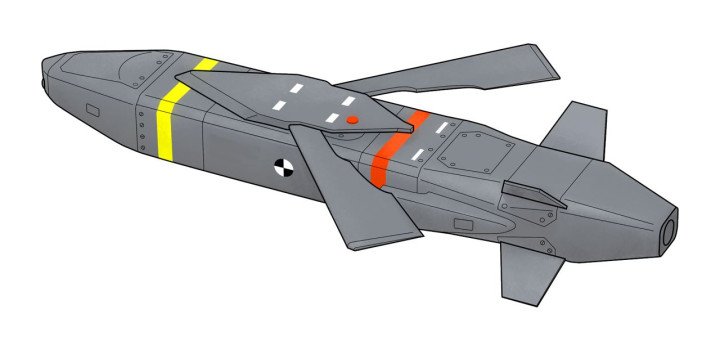- Category
- War in Ukraine
The Great Taurus Debate. Is Missile Delivery To Ukraine Still Up In The Air?
-6aafc9390ad21009d49708d4557aca04.jpg)
Ukraine continues to plead for the powerful long-range Taurus missile, but its main producer—Germany—continues to push back, presenting a variety of reasons and excuses. From leaked secrets to Russia’s wiretapping, we explore the controversy around the decision as to whether to send Taurus missiles to Ukraine.
For almost a year, there has been much controversy and debate surrounding the delivery of Taurus missiles to Ukraine. In March of 2024, the topic became its most explosive yet, after a series of information leaks in Germany.
Ukraine has already received deliveries of some long-range missiles, all of which are believed to have been used effectively. However, the long-awaited long-range Taurus, produced by Germany, would be Ukraine’s farthest-reaching missile yet.
“Ukraine needs long-range missiles so that terrorists do not have a feeling of impunity,” said President Zelenskyy in one of his recent video addresses to the public.
Russian forces persist in targeting Ukrainian cities from launchers strategically positioned far beyond the frontline. That’s why Ukraine has been urgently asking for long-range missiles to deter these attacks and effectively target Russian warehouses, depots, barracks, and supply lines.
“The longer the missile range, the shorter the war,” said Dmytro Kuleba, the Minister of Foreign Affairs, pleading for bolstering Ukraine’s arsenal.
What are Taurus missiles?
Taurus KEPD 350 is a German-Swedish cruise missile with a maximum range of 500 km which is fired from fighter jets. It can travel at a maximum speed of around 1,170 km per hour—almost as fast as the speed of sound—and an altitude of only 35 metres, making it virtually impossible for radar systems to detect.

The Taurus missiles would penetrate further behind enemy lines than even the long-range ATACMS missiles—enhancing Ukraine’s ability to deter attacks and respond effectively to numerous threats. This would give Ukraine a significant advantage in terms of precision targeting and operational flexibility.
The first long-range missiles seen in Ukraine were HIMARS (High Mobility Artillery Rocket Systems) which were delivered in the summer of 2022 by the US. Since then, Ukraine has received numerous short-range ATACMS, and long-range ‘Scalp’ / ‘Storm Shadow’ missiles.
Ukraine’s Defence Minister Oleksiy Reznikov has confirmed that the Ukrainian military has used the ‘Storm Shadow’ long-range missiles with 100% efficiency.
Even Russian propagandist Ilya Tumanov, who runs the aviation-themed Fighterbomber channel, posted that the suspected hit during Ukraine’s ‘Operation Dragonfly’ on October 17th 2023 in Berdyansk—with a Storm Shadow missile—was one of the most painful since the beginning of Russia’s full-scale invasion of Ukraine.
But the Taurus missiles continue to be one of Ukraine’s leading asks when discussing the delivery of military aid with partners. Perhaps because they are considered one of the most modern weapon systems used by the German military. But Western allies, mainly Germany who produce the Taurus missiles, have been reluctant in fulfilling these requests.
Where is the Taurus missile?
Many European leaders have been supportive of Ukraine having the Taurus missiles supplied to them.
UK Foreign Secretary David Cameron suggested that they should exchange Taurus missiles with the British ‘Storm Shadows’. “We are determined to work closely with our German partners on this issue, as we do on all other issues, to help Ukraine," said Cameron.
Anton Hofmeister, a member of the German Bundestag from the Green Party has supported the UK proposal. Friedrich Merz, head of the CDU, the second largest party in the German Government, and Markus Söder, head of their sister party, the CSU, called for furthering that proposal and supplying Taurus missile systems directly to Ukraine.
But this issue is splintering the country's government, as German Chancellor Olaf Scholz continues to push back on the request. His reasons behind this decision have caused some controversy.
“Scholz should give Taurus and stop holding back the security of Europe” Alicia Kearns, chair of the UK’s foreign affairs select committee wrote on ‘X’. “We have a choice. Either we give Ukraine what it needs, or we will see more bloodshed and a complete failure of deterrence.”
Scholz originally said that the Taurus is a weapon that, "in case of incorrect usage, could hit a certain target somewhere in Moscow." He ruled out sending Taurus missiles to Ukraine arguing that it would mean Germany would become a party to the war with Russia. However, his reasons are not quite as they seem and leaked information this month revealed there is more to his hesitation than was publicly understood.
Scholz initially argued that the Taurus is “a very far-reaching weapon” and added, “German soldiers must at no point and in no place be linked to targets this system reaches.” For the third time in 2024, the German parliament's lower chamber voted against the motion to send Taurus missiles to Ukraine.
But leaked information from a meeting of the German parliamentary defence committee on March 11th 2024, revealed new details on special features of the Taurus missiles' and problems Germany would face in supplying them to Ukraine. This was discussed during a 20-minute speech by Carsten Breuer, General Inspector of the Bundeswehr (German Armed Forces.)
He pointed out that the Taurus missiles need an advanced computer system that only the Bundeswehr has. If Germany were to supply the Taurus to Ukraine, they wouldn’t have access to this system themselves and this would significantly disrupt the country’s own defence capabilities.
This information was not meant to be heard by the public. It exposed different reasons as to why Germany won’t supply the Taurus to Ukraine than what Scholz had initially explained. However, this doesn’t change the outcome and still leaves Ukraine without the missiles.
Marie-Agnes Strack-Zimmermann, Chair of the Defense Committee of the Bundestag, intends to launch an investigation into the leak. "We hope to establish the identity of this person, and they will bear the consequences," she told Deutsche Zeitung.
Meanwhile, Olaf Scholz is seemingly frustrated by the Taurus conversations. “The debate in Germany cannot be surpassed in terms of ridiculousness,” he said at the Europe 2024 conference in Berlin. “This is embarrassing for us as a country,” he continued.
Just weeks before this leak, Germany was caught up in another controversy between itself and Russia.
The German Ministry of Defence confirmed that some of their Air Force officers were victims of wiretapping after Russian propagandists released private conversations about the long-awaited Taurus missiles online.
The recording discussed theoretical strikes on the Kerch Bridge in Crimea with Taurus missiles. According to the Russian Federation, the officers also talked about the number of missiles that could be transferred to Ukraine, since "the bridge in the east is difficult to reach."
This leak contradicted the German Government’s rejection of supplying the missile and implied that the Taurus would allegedly be ready for use by Ukraine “in eight months”, confusing matters for the public.
But this recording could have easily been manipulated. Russia is renowned for editing and distorting video and audio materials, spreading fakes to suit their own ideologies and to discredit Ukraine. “At the moment, we cannot say with certainty whether changes have been made to the recording being shared on social networks," said a spokesman for the German ministry.
-46f6afa2f66d31ff3df8ea1a8f5524ec.jpg)

-29a1a43aba23f9bb779a1ac8b98d2121.jpeg)
-5568db4fb3d8644b8f1bf8244594bec1.png)


